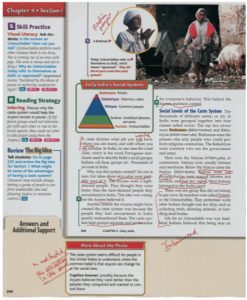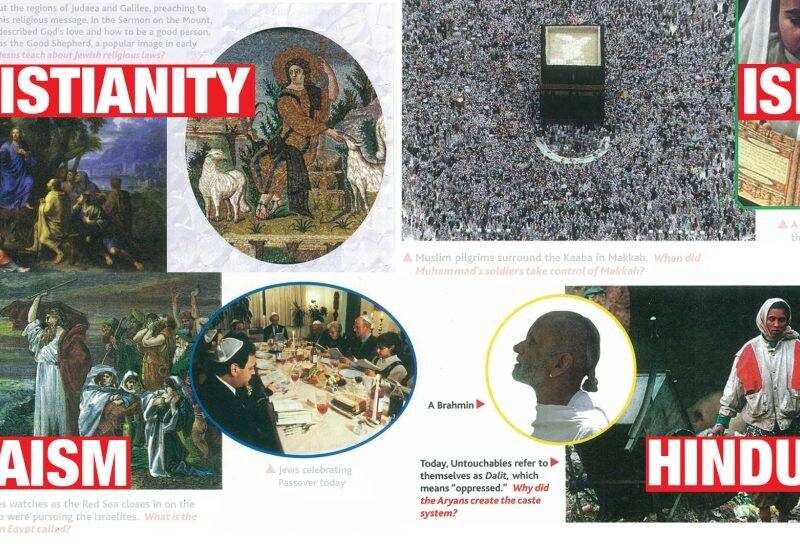

How has HAF been involved in the California textbook issue?
For the past decade plus, HAF has been intimately and actively involved in the process to update California’s history and social science content standards and frameworks, as well as new drafts of its textbooks. Here is a summary that involvement:
- In 2005-2006, HAF sued the State Board of Education (SBE), winning a partial victory that found that the SBE utilized illegal procedures when adopting textbook materials on Hinduism.
- In 2014, HAF spearheaded a bill in the California state legislature that would have created new content standards for Hinduism and other religions. The bill overwhelmingly passed through the state Senate and Assembly, before it was eventually vetoed by the Governor for political reasons.
- Moreover, from 2014-2016, HAF actively participated in the textbook frameworks revision process and launched the #DontEraseIndia campaign.
- This year, we submitted public comment on the latest publisher drafts of the textbooks, which would be distributed to nearly 2 million middle and high school students across the state. HAF team members were in Sacramento the last week of July, as state-appointed review teams deliberated on the content and provided feedback to publishers. Similarly, HAF, along with other organizations and community members attended and made public comments on the textbook drafts at the state’s Instructional Quality Commission (IQC) meeting on August 17.
- Given that California has the highest Hindu American population in the country, we continue to work with Hindu American community members, groups, interfaith allies, publishers, and education officials to ensure that textbook materials on Hinduism are equitable, accurate, and culturally competent.
- The IQC will meet again on September 27-28 to hear public comment and vote to approve the textbooks before they officially voted for adoption by the State Board of Education November 16. HAF will continue to keep members updated, and will mobilize allies to ensure that California’s textbooks represent the community in a fair and equitable manner.
Why does HAF oppose the use of the term ‘South Asian’ in the textbooks?
- “South Asia” is not historical. Geographic and political terms based on events that took place since the mid-twentieth century are anachronistic, that is, they belong to a period other than that being portrayed.
- The term “South Asia” is a post-WWII geopolitical designation to account for the breakup of British India into India, Pakistan, Bangladesh, Afghanistan, Nepal, Myanmar, Sri Lanka, and the Maldives. However, the time period referred to in the Framework narrative predates that period by millennia.
- From ancient times, as noted in historical records, foreigners and Indians alike have perceived of the entire Indian subcontinent as one geographical unit.
- The Framework narrative refers to all other ancient geographical areas by their ancestral terms China, Japan, Egypt, Greece, etc. Only “India” is recommended for a change.
- The attempt to replace India with South Asia has been utilized by academics and activists as an attempt to bring their subcontinental politics into the classroom and sixth grade textbooks, as well as an untoward attempt to erase or diminish the cultural heritage of Indian American students.
Where can I view HAF’s public submission to the state Board of Education on the latest textbook drafts?
- HAF’s 2017 History-Social Science Adoption Public Comment submission, sent via email to the Instructional Quality Commission, is available as a PDF here: https://www.hafsite.org/sites/default/files/2017-History-Social%20Science-Adoption-Public-Comment-Submission-HAF.pdf
What is HAF’s position on the CAPEEM lawsuit?
- We are aware of the lawsuit and believe any group, including CAPEEM, has a right to voice its views on the process. And just like HAF and other groups involved in the process, CAPEEM has the same ultimate goal of improving the depiction of Hinduism and India in the textbook content. At HAF, we will continue to work with various stakeholders in the community, the California Department of Education and others, to ensure that the textbooks are culturally competent.
What are the main issues that remain to be addressed in the presentation of Hinduism in California’s textbooks?
- Primarily, our issue is to ensure that Hindu philosophy and the contributions of Hinduism to the world are highlighted. We want more emphasis on Hinduism’s philosophical goals, and how contributions such as yoga and the Bhagavad Gita continue to influence millions across the world outside of the Indian subcontinent.
- In addition, the textbooks need to be more balanced and equitable in how Hinduism is represented in relation to other religions. For example, the text on other religious traditions tend to emphasize positive elements with little or no reference to negative social practices or issues. The opposite is true for Hinduism, however, with an overemphasis on negative social issues and outdated colonial era theories. This imbalance needs to be corrected.
- Similarly, other Indic traditions, such as Buddhism and Sikhism, are often presented in opposition to Hinduism and as superior religions, when in reality the relationship between Buddhism and Sikhism on the one hand and Hinduism on the other have historically been much more dynamic and fluid. This historical reality needs to be better covered across publisher drafts.
Is HAF working with publishers? If so, why haven’t the textbook drafts improved more?
- We have worked with most of the publishers submitting drafts, and have maintained open lines of communication. However, our input – and that of scholars – is always subject to each publisher’s final decision. Moreover, changes to textbook drafts often don’t come overnight, and in most cases, we have seen improvements in the drafts in some areas in comparison to previous versions. No community gets everything it wants, but we believe the textbook drafts will come much closer to a fair and equitable outcome for the community once this process is over.
I’ve heard HAF is trying to whitewash the history of Hinduism. Is this true?
- That is unequivocally false. If anything, we have tried to nuance the history of Hinduism, given how ancient and diverse the religion is. The reality is that, in a space of a few pages, we are trying to ensure that Hinduism’s philosophy, its spread, and its diversity are covered in a manner consistent with any other religion.
Isn’t HAF trying to diminish the contributions of minorities in India’s history?
- HAF has consistently noted that conflating Hindus and India is problematic precisely because India has been home to thriving religious minority communities for many centuries. Whether it’s Zoroastrians escaping Iran from persecution, flourishing Christian communities since the early common era, Sufi Muslims across northern India, the spiritual home of Buddhism and the Dalai Lama, or the largest population of Sikhs in the world, India’s religious minorities are etched into the society’s social fabric. What we have always pointed out that India’s diversity makes it wrong to simply frame any issues in the country as a majority vs. minority, when it’s far more complicated.
Why is HAF trying to erase the history of caste discrimination in India?
- HAF’s groundbreaking “Not Cast in Caste: Seeking An End to Caste-Based Discrimination in India” was released in 2010 and continues to be the basis of HAF’s anti-caste discrimination efforts. We have partnered with numerous Hindu groups in the Indian subcontinent to eradicate the ills of caste discrimination, as it runs contrary to Hindu scripture. Moreover, by shedding light on how this is a social practice across the Indian subcontinent, we want to ensure that all religious communities work together to acknowledge caste-ism in their own groups and eradicating it.
- HAF’s written submissions and public comments before the Department of Education during both the Frameworks and textbook adoption process have never advocated removing caste from instructional materials. Instead, we have consistently asked that caste or caste-based discrimination not be incorrectly conflated with Hinduism; that caste is not disproportionately covered compared to other topics; that varna and jati be accurately discussed and what has now come to be known as caste evolved over centuries; and that reform movements within Hinduism have always been present to reject caste-based discrimination consistent with Hinduism’s emphasis on the inherent divinity of all beings.








































